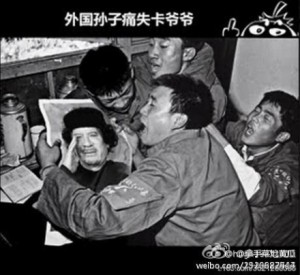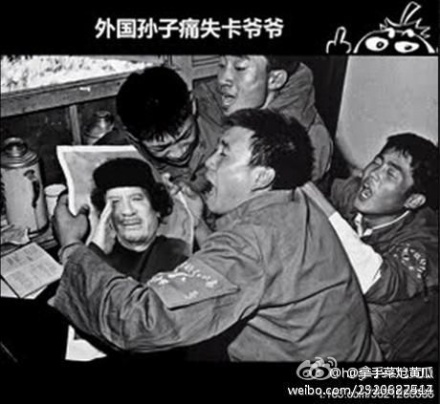Zhōngguó rénmín de lǎo péngyou 中国人民的老朋友
Old Friends of the Chinese People

Mourning an old friend: photoshopped image from the time of Mao’s death. (Artist: Rebel Pepper 变态辣椒)
Official parlance for world leaders and others who have visited China and shown their support for the country. The “friends” most discussed by netizens include the late Libyan leader Muammar Qaddafi, former Iraqi president Mahmoud Ahmadinejad, Syrian president Bashar al-Assad, and Zimbabwean President Robert Mugabe following his awardance of China’s Confucius Peace Prize in 2015 and his house arrest amid a military coup in 2017. The honorary descriptor was first bestowed on Canadian James G. Endicott in 1956 for his support of the revolution. Early on, “old friends of the Chinese people” were ideological supporters, but as China’s foreign policy has become more pragmatic and market-driven, the phrase has been used to describe trade partners and leaders of international organizations.
In 2012 the late Cambodian ex-king Norodom Sihanouk was called an old friend of the Chinese people in state-run media. Netizens objected when the government lowered flags to half-mast for Sihanouk while failing to make a similar demonstration of sympathy for the many Chinese who had died in natural disasters and accidents around the same time.
While the phrase is most commonly used to describe dictators, Xi Jinping did use the phrase to describe departing U.S. ambassador to China Jon Huntsman in 2011. Foreign ministry spokesperson Lu Kang also used the term for current U.S. ambassador Terry Branstad (Branstad is also a literal “old friend” of Xi Jinping’s, having met Xi while a first-term Iowa governor in 1985).
China also occasionally describes its relations with other countries in terms of friendships, referring to Pakistan as an “all-weather friend.” During a 2017 trip where he served as a “special guest” at Pakistan’s Independence Day celebration, Vice Premier Wang Yang said, “Our friendship is stronger than steel [and] sweeter than honey.”
Amid a military takeover of key sites in the Zimbabwean capitol of Harare that confined Robert Mugabe to house arrest in November 2017, several netizens saw comments on this “old friend of the Chinese people” and 2015 recipient of China’s Confucius Peace Prize deleted on Weibo. FreeWeibo has archived several harmonized comments:
LinJiShijiao: Today I suddenly heard about Mugabe and felt a bit flabbergasted. I remember getting to know this name while I was in junior high, is he still a leader? Think about it, if you don’t rule for at least a few decades, how can you qualify as an old friend of the Chinese people?
@林奇视角:今天忽然听到穆加贝,感到有点诧异。记得知道这个名字的时候我正上初中呢,现在还当领导人那?想想也是,不执政个几十年,哪有资格当中国人民的老朋友。(November 15, 2017) [Chinese]
FangwuJun: Old friend of the Chinese “people” and Confucius Peace Prize recipient Mugabe has fallen!!
@防务君: 中国“人民”的老朋友、孔子和平奖获得者——穆加贝下台了!![Chinese]
Weeks prior to the coup in Zimbabwe (which military leaders and Mugabe’s leading ZANU-PF party have insisted is not a coup), Chinese state media featured the 93-year-old Zimbabwean revolutionary who has ruled the country for nearly 40 years congratulating Xi Jinping on on his reelection as CCP general secretary at the 19th Party Congress, and praising his leadership of the CCP and international diplomacy. The Congress that saw the beginning of Xi’s second term fueled long-running speculation that Xi may plan to remain in power beyond the traditional two-term limit.
During the coup in Harare, speculation surfaced that Beijing may have been aware of an impending military move against its “old friend.” A week prior to Mugabe’s ouster, top Chinese military officials hosted General Constantine Guveya Chiwenga. Chiwenga is believed to be an ally of the former Zimbabwean vice-president Emmerson Mnangawa, who was fired by Mugabe on November 6 and looks likely to become the country’s next president. At The Guardian, Tom Philips reports on the recent visit and subsequent speculation, providing context of China’s close relationship with Zimbabwe and quoting denials from Chinese military officials on the situation:
China, which has backed Mugabe since the anti-colonial struggle of the 1970s, is also now Harare’s largest foreign investor, pumping huge sums into the Zimbabwean economy in exchange for natural resources and agricultural products such as diamonds and tobacco.
[…] On Wednesday, as the 93-year-old strongman president was placed under house arrest in Harare, the foreign ministry spokesman Geng Shuang claimed Chiwenga’s visit had been part of “a normal military exchange”. Geng was cagey, however, about what exactly Chiwenga had been doing in China: “As for the details of his visit, I have little to share.”
Geng also tried to scotch speculation that after his sacking last week, Mnangagwa had fled to China, where he is reported to have received military training in the past.
[…] Those ambiguous comments will do little to dispel suspicions that Chiwenga may have travelled to Beijing to warn China’s leadership of the impending move against Mugabe, or perhaps even to seek its blessing or help. Li Zuocheng, a rising star in China’s 2.3 million-member military, reportedly enjoys close ties to the Chinese leader, Xi Jinping. [Source]
In a regular press conference on November 15, Foreign Ministry Spokesperson Geng Shuang expressed “hope that Zimbabwe could properly handle its internal affairs” and reiterated assurances that Mnangagwa was not in China. Cartoonist Ah Ping tweeted his illustrated doubts:
《例行發佈會》
"We do not have any information about Mr. Mugabe but make sure of the friendship between our people and Zimbabwe people!"#dictador Robert Gabriel Mugabe pic.twitter.com/0u6EUKc1Yr— Apinkcartoon (@apinkcartoon) November 16, 2017








